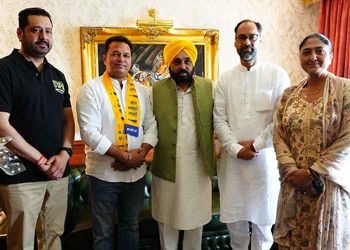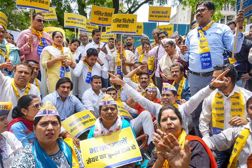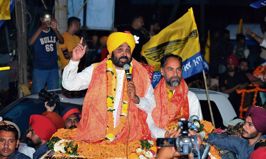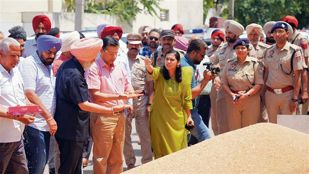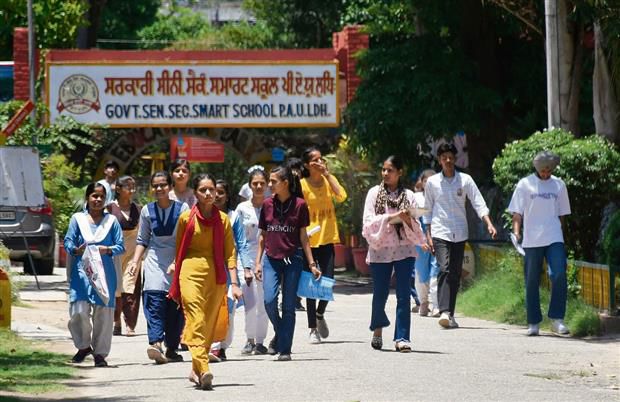
Punjab School Education Department has recently come to the help of government schoolchildren suffering with locomotor disabilities.
Ensure an end to ableist bullying
The Punjab School of Education Department’s initiative of distributing motorised wheelchairs to children with special needs (CWSN) who suffer from locomotor disabilities is appropriate, for it is better late than never. The Indian Institute of Technology (IIT), Madras, developed this much-needed motorised wheelchair for children with locomotor disabilities in order to allow them to safely move outdoors. This battery-powered wheelchair, known as ‘NeoBolt’, can be used even on uneven terrain. The CWSN category denotes children who have disabilities and need extra care and support. These disabilities could include muscular dystrophy, epilepsy, cerebral palsy and locomotor disability, which cause children to struggle with balance. A locomotor disability occurs when a patient’s bones, joints and muscles become afflicted, severely limiting limb movement. PSEB’s generous act of providing motorised wheelchairs is the best gift for them. Regardless of the severity of their physical condition, including children with disabilities in school co-curricular activities is essential for building their self-confidence. There is no recipe for success — all that is required is the authorities’ determination and willingness to do something for children who are differently abled, as they require special care and encouragement. All schools, private and public, should ensure that other children do not tease or mock them differently abled children.
Novin Christopher
QUESTION
In a first-of-its-kind initiative that may go a long way to help the underprivileged sections of society, the district administration has launched a unique programme to take care of leprosy patients and their children and dependents living in Ludhiana district. What else needs to be done to help and facilitate the underprivileged sections of the society in their day-to-day living ?
Suggestions in not more than 200 words can be sent to [email protected] by Thursday (March 28)
More vocational rehab centres needed
About one in 10 of all children worldwide have disabilities. Children with disabilities are mostly those who have long-term physical or mental impairments which adversely affect their full and effective participation in social life. Some children are born with a genetic condition that affects their mental development, some sustain injuries or infections that result in functional consequences, and some are exposed to environmental toxins, resulting in learning disabilities. However, psychological issues are prevalent in all cases. The Punjab Government has introduced a special scheme for locomotor disabled students by providing them motorised wheelchairs in state schools. In the first phase, 50 such wheelchairs have been distributed to locomotor disabled students of classes XI and XII at government schools across various districts of the state. The wheelchairs have been provided free of cost to the children with special needs. Some other steps also need to be taken for the proper rehabilitation of the CWSN, such as setting up more braille presses and libraries, and opening more schools for the blind. Only three Vocational Rehabilitation Centres are running in the state, and this is grossly inadequate to train all differently abled persons in the fields of computer, tailoring, stenography, etc. At least one such rehabilitation centre should be opened in each district.
More NGOs, MLAs and MPs should be roped in to assist in providing skills training to differently abled persons in the state. The Urban Development Departments must provide five per cent reservation in allotment of plots in addition to 10 per cent rebate in the price of the plot to disabled persons. In the allotment of booths in rehri markets, the local bodies should give 10 per cent reservation to the differently abled.
RS Sembhi
We will provide help, support
We have distributed first set of 50 motorised wheelchairs to the locomotor disabled students of Class XI and XII at government schools across 10 districts in the state under the first phase of the project. Our endeavour is to cover all such students in a phased manner and come up with more such schemes to provide all possible help and support to the children with special needs.
— Gauri Parashar Joshi, special secretary (school education)
Need for supportive peer groups
There is a need to make public places, such as schools, hospitals, transport systems and government offices, more accessible and user-friendly for persons with disabilities. This can be done by adopting universal design principles, providing ramps, lifts, signages, tactile paths, assistive devices and other facilities that cater to the diverse needs of persons with disabilities. Teachers and educational staff must be trained in inclusive teaching methodologies to cater to the diverse learning needs. There is a need to create more job opportunities for persons with disabilities, and to provide them with adequate training and support. CSR initiatives can also play a role in promoting inclusive and accessible workplaces for persons with disabilities. Individualised Education Plans (IEPs) should be adopted by collaborating with educators and parents to create a personalised IEP for each child. These serve as personalised roadmaps and tailor learning experiences to each child’s unique abilities. Peer support and social interaction can also help in fostering a sense of belonging, promoting empathy and understanding. Meanwhile, adopting flexible assessment methods by accommodating diverse learning styles can ensure fair evaluation. By weaving these threads together, we can create an inclusive tapestry that empowers these remarkable children to flourish academically and in their day-to-day lives.
Tamanpreet Kaur Khangura
Cross-curricular comprehensive care
This commendable effort underscores a commitment to inclusivity and equity in education. However, to truly empower the CWSN and facilitate their studies and day-to-day living, further action and comprehensive measures are imperative. Beyond the initial intervention, sustained support and specialised resources are essential to address the diverse needs of CWSN in the education system. Firstly, there is a pressing need for tailored educational programmes and individualised learning approaches that cater to the unique abilities and challenges of each child. This involves the provision of assistive technologies, adaptive learning materials and accessible infrastructure to create an inclusive learning environment that fosters the holistic development of CWSN. Moreover, fostering awareness and sensitivity among educators, peers and the broader community is crucial in promoting acceptance and inclusion of CWSN. Training programmes and workshops on disability awareness and inclusive teaching practices can equip educators with the necessary skills and knowledge to support CWSN effectively and create a culture of empathy and understanding within schools. Furthermore, collaboration with relevant stakeholders, including parents, disability rights organisations and healthcare professionals is essential in developing holistic support systems for CWSN. This entails establishing multidisciplinary support teams to provide comprehensive care, including medical, therapeutic and psychosocial support to address the diverse needs of CWSN and enhance their overall wellbeing.
Shruti Saggar
Teams should monitor provision of facilities
It is a great effort by the state government for the children with special needs studying at government schools. Here, locomotive disability means disability of the bones, joints or muscles leading to substantial restriction of the movement of the limbs or any form of cerebral palsy. The government should make it mandatory for private schools to follow the same norms for children with special needs. They should be allowed to sit with other children so that they should not feel any inferiority complex. Special teams should be formed to check whether these facilities are provided regularly in schools. Every classroom must be organised in a manner that no child with special needs is deprived of any facility. There must be some entertainment sessions for these students. Teachers and students must cooperate with these students with special needs. They must be allowed to participate in games and other activities of the school so that they feel encouraged.
Dr Mohd Saleem Farooqui
Develop skill training facilities
It is our responsibility to take care of the children with special needs (CWSN). The country must consider them as a special group and establish separate facilities for their schooling and training. All efforts must be made to make them good citizens with special programmes for this purpose. The state must develop facilities in the country depending on the needs of such children. These children should be provided with proper skills training as well. All their needs must be duly met. The general public must also be educated to be empathetic to their needs. We should ensure the CWSN do not develop a feeling that they are less privileged and neglected individuals in a free India. The CWSN group of children after due schooling and training need to be given jobs suited to their training so they also contribute to the development of the nation.
Gautam Dev
Promote values of equality, fraternity
Nowadays, inspite of having many economic and reservation benefits, many CWSN do not want to go to school due to the harassment and the mental pressure these young guns face from their peer groups and teachers, often in the form of hatred. Promoting the values of equality, integrity and fraternity is need of the hour. Articles 14-18 of the Constitution also promote right to equality as the fundamental right of all the citizens of the country and executing these rights is the duty not only of the local government but also of the common masses. Organising motivational events for these CWSN and showing the bravery of these young guns in para-Olympics this year will definitely inform the outlook of not only the able-bodied but the CWSN as well. Parents too need to play a vital role in the form of providing good family values to their wards like gratitude and good moral. Special training sessions are needed for teachers on how to maintain good classroom atmosphere and bridge the gap of thoughts in order to maintain trust and harmony between CWSN and able-bodied students.
Miyush Trehan
Need for personalised lesson structuring
The principle of individual differences is universal. Every child is unique in his/her own way. So are the CWSN. In order to facilitate them in their studies and day-to-day living, the teachers and parents should play a proactive role. The teachers should pay special attention to the kids who have special needs and structure the lessons to make them more inclusive. Teachers should not divide the class, instead they should group students with and without disabilities together. Moreover, growing and learning together will make them more empathetic towards the needs of such children. Appointment of teachers having expertise in dealing with such children can be of great help. Provision of resources and most importantly a supportive and positive environment is much needed. Parents should not force their children that they always have to be successful, they should rather help them in coping up with challenges. Personalised teaching is the requirement and the classes should have a desirable number of students. Providing the CWSN with therapy sessions will do wonders. Development of least restrictive environment in the classroom too can be of great help. The government should assist the CWSN in their social, intellectual and physical development.
Manmeen Kaur
Architecture should be inclusive
This initiative by the government should be applauded. The programme can be made further inclusive by facilitating CWSN of all kinds. The guidelines and resources should be gathered from people running NGOs, caretakers, teachers of CWSN, specially-abled people and doctors. Blind children often feel side-lined as their textbooks are not available in braille or audio versions. This makes them dependent on their peers. This dependance can be reduced by creating coursework in braille and by also providing audio versions. The appointment of braille teachers will limit the need to look for a scribe to write exams as well. The architecture of the buildings should be accessible for the specially-abled. Ramps, lavatories, lifts and rooms for the CWSN will be a positive step towards ease of living. The public in general should be sensitised about the behavioural patterns, needs and requirements of the CWSN. Group activities, functions, visits and seminars at Divyang Kendras can help bridge the gap between ‘able’ society and the CWSN.
Tanvi Aggarwal
Join Whatsapp Channel of The Tribune for latest updates.























